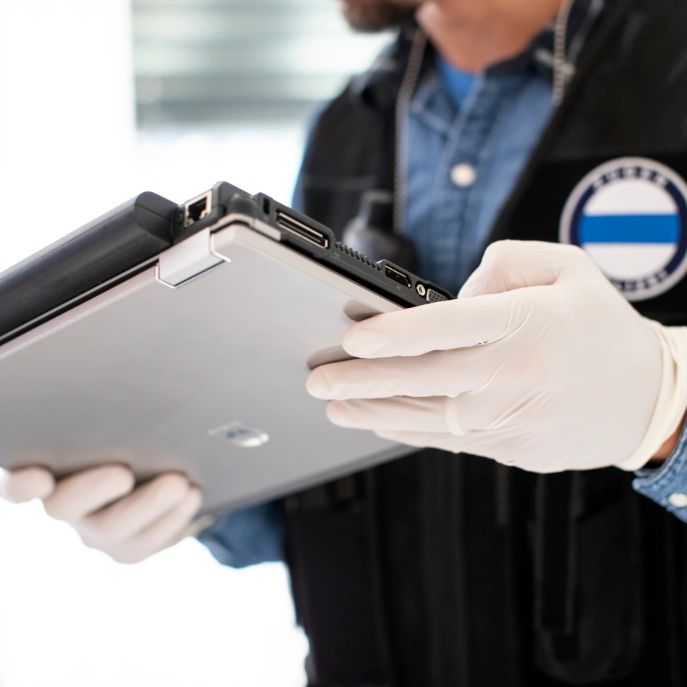Criminal Investigation Department
Robbery, homicide, arson and various other crimes, including sexual offenses, economic crimes and cybercrimes, keep our criminal police investigators occupied. They detect crimes and work to solve or prevent them if possible. To do this, they rely on their extensive knowledge and a nationwide network.

About us
Our Criminal Investigation Department handles a wide range of crimes, including capital crimes such as homicide, robbery, severe bodily injury, human trafficking, sexual offences and arson, as well as economic and property crime, social security fraud, drug-related fraud, and all forms of organized and cybercrime. The investigators collect evidence, question suspects and witnesses, analyze all available information and draw their conclusions, always with the goal of solving the case.
Services of the Criminal Investigation Department
Our specialized investigation staff primarily deal with violent and structural crime. They prosecute serious crimes, particularly in the areas of
- serious drug-related crime,
- serious crimes against property,
- serious crimes against life and limb and against freedom (capital crimes),
- serious sexual offenses,
- dangerous crimes (e.g. arson)
The service is also the point of contact for organized crime, human trafficking and cultural property.
In close cooperation with the public prosecutor handling the case, our investigators collect and evaluate information and evidence. They interrogate suspects, informants and witnesses and also carry out overt and covert measures such as house searches or telephone surveillance.
The two specialized units for special investigative measures and pedocriminality are affiliated to the service. While the former conducts preliminary investigations in crime-prone environments, the pedocriminality unit conducts proactive investigations on the internet to prevent and detect sexual acts with children and other serious crimes.
Our forensic scientists secure and evaluate evidence. They use the latest equipment, procedures and technologies to search for all types of evidence. This includes biological traces such as skin particles and blood splatters or micro traces such as fibers from clothing and paint chips. Fingerprints and traces of tools, shoes or weapons can also be crucial. The secured material can be used to identify people, assign objects and reconstruct the course of events.
The service also carries out all forensic identification tasks. These include taking fingerprints or, in the case of more serious crimes, taking a cheek swab for DNA profiling. The forensic technicians also create mug shots and collect the description of suspects.
IT forensics specialists secure and evaluate data related to a crime. The focus is on criminal data such as pornographic images or malware. The IT forensics experts also find clues on the devices that point to personal and device connections.
The Cybercrime and Economic Crime Unit conducts preliminary proceedings into both computer and internet-related offenses and classic white-collar crimes such as fraud, embezzlement and forgery. In addition, there are bankruptcy offences, offences in the area of intellectual property rights and social assistance and social security fraud. The areas of activity are rounded off by the processing of property crimes involving crypto currencies, as well as prevention work and advice on how to avoid cyber and economic crimes.
The Cybercrime and Economic Crime Unit of the Police of Zug is an official body recognized by OFCOM to combat cybercrime. It is responsible for enforcing and monitoring the Ordinance on Internet Domains (ODI) in the canton of Zug. The unit is also a member of the Network for Investigation Support in Digital Crime (NEDIK).
Cybercriminals and white-collar criminals do not limit themselves to certain industries or individual countries. Rather, investigators in the canton of Zug have to deal with international corporate constructs, cyber networks and internationally operating criminal groups, as well as complex money flows around the world. The proceedings are demanding and the investigations take time.
Our police officers in the Youth Offences Service investigate crimes committed by minors. In addition to investigating, their tasks include intervention, prevention and networking. They work closely with schools, institutions and authorities. Our employees ensure that cases involving young people are dealt with efficiently and that they are handed over to the juvenile prosecutor.
Specialists in the field of juvenile crime also patrol places that are frequently visited by young people. With their presence, discussions and lectures, they perform important preventive work. The focus is particularly on young people who have repeatedly come into conflict with the law.
The aim of the Preventive Measures Service is to prevent serious crime through proactive policing. Multidimensional prevention aims to protect the public through close cooperation between various internal specialist units and interdisciplinary networking. The Protection from Violence Unit, the Domestic Violence Unit and the Weapons and Explosives Unit are combined in this service.
Our employees are responsible for analysis, asset recovery and legal assistance.
The specialized unit for criminal analysis combines the elements of tactical, strategic and operational criminal analysis. The overarching goal is to develop a basis for decision-making for managers and to support investigative services in analyzing case data. Tactical analysis is concerned with the continuous evaluation of police data in order to obtain a real-time picture of the situation regarding serial crime. Operational analysis relies on the evaluation of crime-related data from individual cases or a series of cases in order to support investigators with visualizations, hypotheses and recommendations. As part of the strategic analysis, police data is evaluated and made available to the organization in the form of statistics.
The Asset Forfeiture Unit works under the maxim “Crime doesn't pay” – crimes should not pay off, because the confiscation of unlawfully obtained assets often hits the accused harder than the punishment itself. The specialist unit supports the investigating services in tracking down assets wrongfully obtained by criminals, seizes these and liquidates them in cooperation with the public prosecutor or the courts. At the same time, recourse to the offender's legal assets can be arranged to cover procedural costs, fines or claims of the parties.
The Legal Assistance Unit combines the expertise needed to handle international and national legal and administrative assistance in criminal matters. It is an information hub for cooperation with Interpol and Europol. As a business location, the canton of Zug offers favorable conditions for operating companies and domiciliary companies. Unfortunately, these are also used by criminals from Switzerland and abroad as a cover for illegal business, with domiciliary companies in the canton of Zug being misused. This has led to an increasing volume of national and international requests for mutual assistance being processed by mutual assistance specialists. The results of their work are important for the requesting authorities and for their own criminal proceedings. Mutual assistance helps to secure physical or digital evidence and to establish the facts of the case.
Our Internal Investigations staff are responsible for ensuring the quality of police reports. In basic and advanced training, they impart the necessary knowledge about how the police process cases.
In addition, the internal investigators operate the online police station “Suisse ePolice”. They process the reports received in a timely manner and enter stolen “property and vehicles” in the search system.
On behalf of the public prosecutor, they allow insurance companies to inspect reports (e.g. after accidents, burglaries, etc.) and are responsible for archiving police files with the corresponding deletion periods.
Finally, the Internal Investigations Service supports the heads of operations in police proceedings in the case of plannable operations, spontaneous incidents with the operation of the detention center and major incidents, so that all relevant facts and documents are included in the police report. This is done by taking over quality assurance, file finishing and file disposition.
Monday 08:00 - 11:45 13:30 - 18:00
Tuesday to Thursday 08:00 - 11:45 13:30 - 17:00
Friday 08:00 - 11:45 13:30 - 16:30
Bitte beachten Sie, dass vor offiziellen Feiertagen spezielle Öffnungszeiten gelten.
Im Notfall wählen Sie den Polizeinotruf 117.


